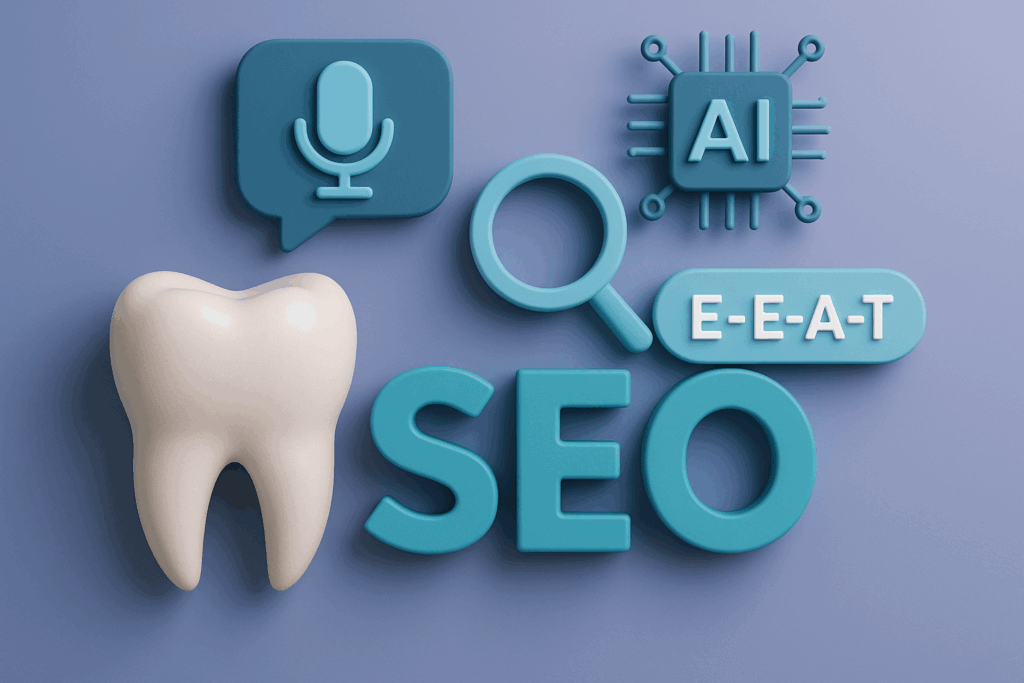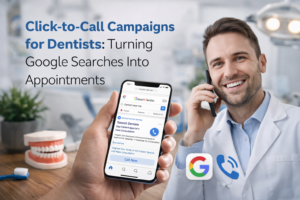When was the last time you asked Siri, Google Assistant, or Alexa to find something for you? Was it just a couple minutes ago, yesterday or just recently?
There’s no way we can escape AI now because they are already here. Voice search, artificial intelligence (AI), and Google’s EEAT (Experience, Expertise, Authoritativeness, Trustworthiness) framework are reshaping the future of digital marketing. And yes, that also includes dental SEO marketing.
If you’re a dental practitioner looking to stay ahead of the curve and want to play alongside big leagues in the digital arena, then it’s high time to rethink your dental SEO strategies. Let’s dive into how voice search, AI, and EEAT are changing the game for dentists, and how you can leverage them to grow your practice.
Voice Search: Your New Dental Assistant
Voice search is skyrocketing, especially now with more and more AI tools emerging. Nearly 50% of adults use voice commands daily, asking questions like “Hey Siri, where’s the nearest dentist?” or “Alexa, what’s the best dental clinic near me?”
If your dental practice is not optimised for voice search, it’s likely you may be missing opportunities to reach local patients actively searching for dental services.
How to Optimise Your Dental Website for Voice Search
More patients are now using voice commands like “Hey Siri, where’s a good dentist near me?” to find dental clinics. To make sure your practice shows up in these results, here are four easy ways to improve your dental SEO marketing for voice search:
1. Use Natural, Conversational Phrases
People speak differently than they type. Instead of just using keywords like “dentist Melbourne,” add full phrases or questions like “How do I stop a toothache fast?” or “What’s the best treatment for sensitive teeth?”
These help your content match how people actually talk to their phones or smart speakers.
2. Add a Helpful FAQ Section
Patients have lots of questions in their mind, and your website should be able to answer them in writing or even in speech. Include a simple FAQ page with answers to common questions like “How much does a filling cost?” or “Do you offer kids’ dental check-ups?”
Voice assistants often pull answers directly from FAQ sections. If you have this ready on your website, it will likely boost your chances of being featured.
3. Focus on Local Info
Most voice searches are for local services, like “emergency dentist near me.” To keep you relevant and the top contender for recommendations, make sure your Google Business Profile is updated with your clinic’s location, contact details, and opening hours.
Also, include your suburb or city on your website pages to help you appear in local results.
4. Make Sure Your Website Is Fast and Mobile-Friendly
Many voice searches happen on mobile. If your site loads slowly or looks clunky on a phone, Google is less likely to show it, or that patients will get tired of waiting for your dental website to load.
Simple fixes like compressing images and using a mobile-responsive design will make a big difference in performance (and conversion).
AI: The New Backbone of Dental SEO
As we mentioned, AI is no longer futuristic. It’s here now, and it’s reshaping how search engines deliver results. Google now uses AI to better understand what people are really searching for. Instead of just matching keywords, it looks at the meaning behind the search.
Here’s how AI impacts your dental SEO strategies:
Enhanced User Experience:
Google’s AI rewards dental websites that provide clear, relevant, and helpful content. The smarter Google’s AI gets, the more it prioritises user-friendly sites. Investing in AI-driven analytics tools can help you better understand your visitors’ behaviors, enabling you to tailor your content more effectively.
Smarter Content Creation:
AI tools like ChatGPT help dentists and marketers quickly create valuable content that resonates with patients. The better your content matches what people want to know, the more likely Google is to show your page in search results. This is why high-quality, relevant content is more important than ever for SEO for dental clinics.
Whether it’s educational blogs on oral hygiene, dental procedure explainers, or patient testimonials, AI may help you generate engaging content that boosts your dental SEO performance.
However, it’s best to take note to leverage AI tools ethically, and make sure your content adheres to the Australian Health Practitioner Regulation Agency (AHPRA) and Australian Dental Association guidelines.
EEAT: Google’s Measure of Trust for Dental Websites
EEAT stands for Experience, Expertise, Authoritativeness, and Trustworthiness. It’s Google’s way of evaluating if your dental website deserves to rank high in search results.
Why E-E-A-T Matters for Dental SEO
Google treats dental websites as “Your Money or Your Life” content. That means Google wants to be extra careful about what health advice it shows users. So, your site needs to show you’re experienced, qualified, and trustworthy.
Here’s how you can do that:
Experience
To present that you have experience as a dentist, show that you have actually worked with real patients. Add testimonials, share case studies (with permission), and talk about your own experience as a dental professional. For example, write a blog about your approach to nervous patients or share a story about a smile makeover.
Expertise
List your qualifications clearly. Include bios for you and your team with details like education, years of experience, and any special training. You can even showcase your AHPRA registration to let patients know you strictly abide by the legal guidelines set by the government. If you publish dental blogs, they should be written or reviewed by someone qualified. This shows both Google and your patients that your advice is reliable.
Authoritativeness
Get your practice noticed by reputable websites. That might mean getting mentioned in local media, being listed on dental directories, or earning links from respected health websites. Also, positive online reviews and memberships (like the Australian Dental Association) help establish your authority.
Trustworthiness
Make it easy for patients to trust your website. Use HTTPS (a secure site), list your contact details, and include your physical clinic address. Add a privacy policy if you collect patient information. And always make sure your content is fact-checked and accurate.
When you apply E-E-A-T principles, your site will not just rank better on Google, it will also give patients more confidence to choose your practice.
Embrace the Future of Dental SEO
The digital landscape is continuously evolving, and dental practices that evolve with it will thrive. If you’re serious about growing your patient base and staying ahead of your competition, embracing voice search optimisation, AI-driven strategies, and Google’s EEAT framework is no longer optional, but a necessity.
If you’re feeling overwhelmed by the constant evolution in dental SEO, our team is ready to take care of it for you. At Dental Rank, we’re professionals in dental SEO marketing and specialise in helping Australian dental practices navigate these cutting-edge SEO strategies.
Schedule your free consultation with us at Dental Rank to discover what your dental website can achieve as the digital landscape revolves.




